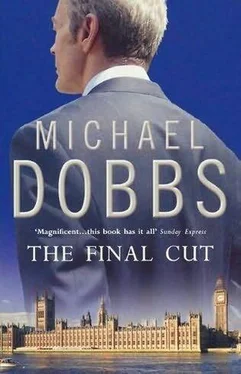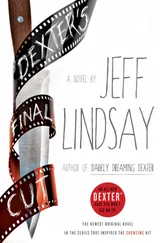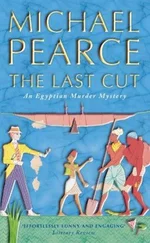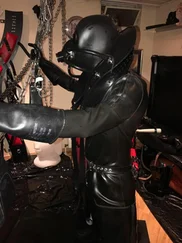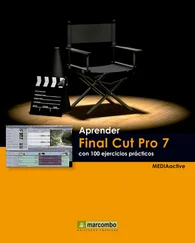Michael Dobbs - The Final Cut
Здесь есть возможность читать онлайн «Michael Dobbs - The Final Cut» — ознакомительный отрывок электронной книги совершенно бесплатно, а после прочтения отрывка купить полную версию. В некоторых случаях можно слушать аудио, скачать через торрент в формате fb2 и присутствует краткое содержание. Жанр: Политический детектив, на английском языке. Описание произведения, (предисловие) а так же отзывы посетителей доступны на портале библиотеки ЛибКат.
- Название:The Final Cut
- Автор:
- Жанр:
- Год:неизвестен
- ISBN:нет данных
- Рейтинг книги:5 / 5. Голосов: 1
-
Избранное:Добавить в избранное
- Отзывы:
-
Ваша оценка:
- 100
- 1
- 2
- 3
- 4
- 5
The Final Cut: краткое содержание, описание и аннотация
Предлагаем к чтению аннотацию, описание, краткое содержание или предисловие (зависит от того, что написал сам автор книги «The Final Cut»). Если вы не нашли необходимую информацию о книге — напишите в комментариях, мы постараемся отыскать её.
The Final Cut — читать онлайн ознакомительный отрывок
Ниже представлен текст книги, разбитый по страницам. Система сохранения места последней прочитанной страницы, позволяет с удобством читать онлайн бесплатно книгу «The Final Cut», без необходимости каждый раз заново искать на чём Вы остановились. Поставьте закладку, и сможете в любой момент перейти на страницу, на которой закончили чтение.
Интервал:
Закладка:
From his position on the benches three rows up, Makepeace stepped sideways into the gangway. Was he running away? The prospect brought the House to instant and observant silence. He stepped down towards the floor of the great Chamber, to the red lines drawn on the carpet which separated Government side from opponents by the measure of two swords, the boundary between friend and unremitting foe. Then he stepped across. Not a heart beat anywhere, not a sound to be heard, a Chamber so packed with emotion yet as though frozen. They watched as Makepeace mounted the steps through the benches of Opposition, one, two, three rows, and took a vacant seat.
The House exhaled with a single breath as life returned and tumult was restored. They had witnessed a slice of parliamentary life so rare it would fill their chronicles and be retold to grandchildren around the fire. Makepeace had crossed the floor, abandoned his party, torn up the rule book and declared war on Urquhart, to the last breath.
Yet as he looked across the Chamber to the benches from which he had fought for so many years, Makepeace thought he saw the shadow of a faint, fugitive smile cross Francis Urquhart's lips. The eye of an inhospitable Levantine sun stared down upon the Cypriot capital, baking the narrow streets of the central city like bricks in a kiln. Hugh Martin was relieved to reach the air-conditioned sanctuary of the Power House, a former electricity generating station which had been turned with considerable imagination into one of the old quarter's most exclusive restaurants. Works of fine contemporary art competed with menus and wine lists for the attention of the well-heeled clientele, one of whom, Dino Nicolaides, was editor of the Cyprus Weekly and intent on conducting an in-depth interview with his guest. For that purpose he had commandeered the seclusion of the table by the door which led to the rear courtyard.
Martin apologized to the editor for the presence of Drage – the atmosphere in Nicosia in recent days had soured like uncollected rubbish, and demonstrations of one sort or another had become a daily occurrence, with the demonstrators becoming increasingly confused about whether the target of their protest was the Turks, the British or the Cypriot Government itself.
'Summer madness,' the editor agreed, and Drage was deposited on a stool by the bar.
If the furniture and decor were fashionable, the hospitality was in best Cypriot tradition and Martin was soon relaxed. Drage, however, could afford no such luxury, having been inducted by his superiors into the Order of Toasted Testicles with crossed pokers after the fiasco outside the museum. 'Never again,' his superiors had admonished. 'Better a widow's pension for your wife than you make a complete ass of yourself on the main evening news.' Never again, Drage had vowed. He sat eagle-eyed on his stool, the innocuous flight bag in which he carried 'the necessary' perched on the bar beside him, fingers tapping nervously upon his knees. He offered a perfunctory smile but no conversation to the two Cypriots who stood beside him at the bar ordering drinks.
The incident, when it arrived, did so with extraordinary speed. Halfway through the meal a guest from a nearby table rose and crossed to greet the editor and diplomat, an action which in itself aroused little suspicion in such a small community. Drage, however, was immediately on his guard, cursing that the bright sunlight which streamed through the window was burning into his retina as he stared, turning all those around the table into silhouettes. He blinked, blinked again, searching the profile of the new arrival for any sign of the unusual. Drage did not notice – could not have noticed in the circumstances – the eyes of the High Commissioner growing large with alarm and searching in his direction. Martin's arms remained motionless on the table, as he had been ordered. It was in the same moment when Drage thought he might have detected the outline of a small barrel protruding from beyond the far side of the intruder that the door immediately behind the table and leading to the courtyard began to open. Fear began to rise through his veins. Drage made a grab for his bag.
Impossible! As he reached for the zip which secured the flight bag he discovered that it had been smeared with super glue. Child's play! Yet so extraordinarily effective. The fastener was stuck solid, the revolver and alarm transmitter inside as inaccessible as though they were still locked in the High Commission's vault.
Two men – Drage's companions from the bar -had now entered through the rear door. One was waving what appeared against the glare to be some form of sub-machine gun while the other helped hustle the High Commissioner up and out. The submachine gun had stopped waving and for several seconds the attacker was pointing it fixedly in Drage's direction. Then he, too, was gone. Not even a scream, it had all happened so quickly and most guests in the restaurant were still enjoying their food, their first thought of alarm arriving only as Drage kicked over the bar stool in his lunge for the door. It was, as he knew in every fibre it would be, locked. By the time he had made it out through the restaurant's main entrance and around the side into the chrysanthemum-covered courtyard, the getaway car was speeding off and already lost in the narrow streets of the carpenters' quarter. He didn't even get a make, let alone a number. He had lost the British High Commissioner. He sat behind the drawn curtains of his Commons room, eyes closed. The storm was about to break around him and there could be no retreat. Fate, destiny, the games of gods, call it what he might, had contrived to bring him to a time of great decision; if he failed the test they would say he lacked not the opportunity, only courage.
Less than twenty minutes after Makepeace had crossed the floor and changed the face of parliamentary politics, Urquhart had heard of the kidnapping of Martin. Havoc wherever he looked. And in havoc, opportunity. For war had been declared against him on two fronts, the first upon a parliamentary field where his skills and sagacity were matched by none, the other in a distant arena which was one of the handful in the world where British troops were still stationed. An arena which he knew so well, where the long journey of his manhood had started, and might yet finish. Where Makepeace would have trouble following, and wouldn't even know what the spoils were.
There was a knock on the door, a secretary's head appeared. 'Prime Minister, the Cabinet have all assembled.'
'A moment more. Ask them to give me a moment more.'
A final moment, a last listen to the voices inside that spoke of tempests and terrible trials. These were skies of blood which foretold men's doom and which others dared not walk in. But Francis Urquhart dared. He had wars to fight, and without delay. For in war, timing was everything. And that time had come. He had sent the wheel of fortune spinning and there was nothing to do but relish the exhilaration of the risk. He felt better than he had done in months. There was a lightness to his step as he walked the few yards from his room back into the Chamber, clutching his piece of paper, a single sheet with a simple portcullis crest and in his own hand, a note which would end up in the Urquhart Library. Or in the Tower. That reminded him, perhaps he should get Booza-Pitt to add a simple amendment to his Bill providing tax breaks for companies who contributed to educational funds. Like the Urquhart Library or the Endowment. There was still time. Just.
The Chamber was full, aware that such an extraordinary and impromptu gathering of Cabinet Ministers betokened considerable drama. MPs rustled like leaves in a drying autumn wind as Urquhart placed the single sheet upon the Dispatch Box, smoothing its cream edges, and began.
Читать дальшеИнтервал:
Закладка:
Похожие книги на «The Final Cut»
Представляем Вашему вниманию похожие книги на «The Final Cut» списком для выбора. Мы отобрали схожую по названию и смыслу литературу в надежде предоставить читателям больше вариантов отыскать новые, интересные, ещё непрочитанные произведения.
Обсуждение, отзывы о книге «The Final Cut» и просто собственные мнения читателей. Оставьте ваши комментарии, напишите, что Вы думаете о произведении, его смысле или главных героях. Укажите что конкретно понравилось, а что нет, и почему Вы так считаете.
